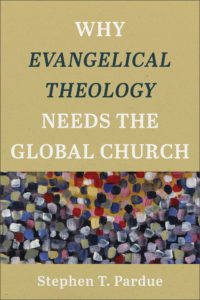About Why Evangelical Theology Needs the Global Church
A Conversation with Stephen Pardue
Every Voice: What led you to write this book? What problem or issue(s) are you seeking to address?
Stephen Pardue: Most evangelicals are aware at this point that the composition of the church has radically changed over the last century, so that the church is now extremely diverse, with the majority of Christians living in the Majority World (Asia, Africa, and Latin America). But if you ask: what difference should this make for the practice of theology or biblical studies, I think most evangelicals aren’t totally sure how to answer that. This is certainly true in much of the West (where this can feel like someone else’s problem), but it’s also true in many Majority-World contexts.
This is partly an “access” problem—people just need more opportunities to engage the resources emerging from the Majority World at present. That’s the problem I have focused on for the last 10 years, co-editing the Majority World Theology series (which culminated in the one-volume, Majority World Theology) and more recently, books like Asian Christian Theology.
But it’s also a “why” problem. That is, many of my students and colleagues who are excited about these projects—both in the West and in the Majority World—still needed a resource that could explain why these projects are important and how “contextual theologies” connect with evangelical commitments. So I tried to write something that would address that “why” problem, and also highlight the increasing literature available in this area.
EV: What is the thesis of your book?
SP: The book contends that evangelical theology (and evangelical biblical studies) should involve collaboration from across the whole church, which in part means grappling with the reality that the present-day church is more culturally diverse than it has ever been.
Specifically, I try to offer a biblical and theological explanation that evangelicals—who have kind of been “late adopters” and even skeptical or critical of theological work that intentionally engages culture—should be interested in this task. I argue that Scripture itself calls evangelical theologians to attend to the church catholic in all its wild diversity, and to consider local cultures a material theological good. When you trace the Bible’s engagement of cultural realities from Babel (Gen 11) to Pentecost (Acts 2) to the great multitude (Rev 7), you see that even if culture is in human sin and the fall, it is also a key way God chooses to reveal himself and commune with his people. Thus, even in Rev 7, redeemed worship in individual languages continues!
If this is correct, we have good reasons to use not only our local cultural resources as we interpret and apply Scripture but also to listen well to the voices of the vibrant churches of the Majority World. When we foster “catholicity”—being attuned to the whole church scattered around the globe—we do theology and biblical interpretation that echoes the biblical perspective on culture and diversity.
This leads to what I think is a distinctively evangelical vision for “contextual theologies” summed up in five theses, along with case studies from Majority World writers who illustrate these principles.
EV: Who’s your target audience, and what are you most hoping they hear from it?
SP: The book is targeted at undergraduate and seminary students first and foremost, but of course, I’m grateful whenever I hear that regular people are picking it up and finding it useful. For those who are coming to the book with some skepticism of the “contextual theology” project—wondering if it will create tension with their evangelical commitments—my hope is that the book helps address those concerns and casts a vision for engaging culture theologically in a way that is deeply faithful to Scripture and the church’s historic teaching.
For those who already believe culture has an important shaping role to play in our reflection on God and Scripture, I hope that they find that the book equips them to go a little deeper in their thinking, and maybe even to challenge their vision for what it means to engage the whole church (including present-day diversity as well as the diversity of the church’s tradition).
EV: Did you have any “aha” moments while writing the book?
SP: Yes, lots of them! One thing that really crystallized for me was a parallel between how evangelicals have engaged tradition as a theological resource and their engagement with culture.
Here’s what I mean. Three decades ago, it was common—standard, even—for evangelical theology books and commentaries to essentially ignore the voices of Christians that were more than 200 years old, with pre-Reformation voices often treated only as negative foils. But for a variety of reasons, evangelicals are now more open to the idea that resources from the “Great Tradition” can be an important and informative source for us, even as we rightly regard Scripture as the norming norm above all other sources.
My argument in the book is that culture needs the same treatment. For decades, culture was treated as only of peripheral significance for doing theology and reading Scripture; evangelicals were even fiercely protective against culture having a shaping influence, fearing (often rightly) the threat of cultural idolatry. But like tradition, culture has an unavoidable shaping force for our theological reflection. We have to learn to wield it well rather than try to ignore or deny its influence.
EV: What was the most challenging part of the book to write?
SP: I really set out to write a book that was sharing the work of others. I had been engaging the “contextual theology” conversation for a long time, and thought I’d just kind of try to bring a lot of different threads together in one place for students and interested readers.
But as I got into the actual writing, I realized that there was just a lot more “construction” that needed to be done. Much of the last few decades of work in the area of contextual theology has been done by Roman Catholic or Mainline Protestant theologians, and while much of it is very useful, evangelical readers are coming at these issues with different questions and background assumptions. Meanwhile, evangelical missiologists have done great work in this area, but are primarily focused on practical ideas—how to translate, how to plant indigenous churches, etc.—which again is useful, but different from what we’re trying to do in the disciplines of theological studies or biblical studies.
So I would say I struggled for quite a while to really put the pieces together in a way that made the most of what had already been said but also laid things out in a way that would make sense to evangelical readers.
EV: What kind of seminary/church classes should assign your book?
SP: My hope is that the book will be useful in any introductory theology class, as well as anywhere in the curriculum that focuses on helping people think about how culture impacts our reflection on and proclamation of the biblical story.
About the Author

Stephen Pardue (PhD, Wheaton College) is Program Director for ThM/PhD in Theological Studies at Asia Graduate School of Theology (Manila, Philippines).

